Children’s Activities
Penn Museum
Online events. Info: https://www.penn.museum/calendar.
29 At-Home Anthro Live: Can Trees Be Calendars?; 1 p.m.
Conferences
23 Financing Urban Adaptation to Address Climate Change; will highlight the implementation and financing of subnational programs and projects designed to adapt to global warming-induced hazards that threaten urban lives and livelihoods; 8:30 a.m.-5:15 p.m.; online webinar; register: https://tinyurl.com/iur-conf-mar-23 (Penn Institute for Urban Research). Also March 24, 8:30 a.m.-1:15 p.m.
24 Women of Color in Higher Education Summit; seeks to unite and strengthen networks and form mentorships for the Penn GSE and SP2 community of both women of color and non-binary people of color; 3-7 p.m.; Houston Hall; register: https://tinyurl.com/gse-conf-mar-24 (Graduate School of Education).
25 Migrant Subjects Across & Within; brings together undergraduate students from across the humanities and beyond to explore various research topics; 9 a.m.-2:15 p.m.; room 623, Williams Hall (Wolf Humanities Center).
Privacy & Law in the Modern Age: An ACS Symposium; will feature panels by leading privacy experts and scholars, including special guest Sheldon Whitehouse, U.S. Senator; 9 a.m.-6:30 p.m.; in-person; register: https://acsprivacysymposium.eventbrite.com (Carey Law School).
26 Hermogenes and Hellenistic-Roman Temple Building in Greece and Asia Minor: Messon – Teos – Magnesia – Sardis; brings together specialists from Turkey, Greece, and the U.S. in order to contextualize this renewed attention on Hermogenes in view of current research on temple architecture in both Greece and Turkey; 9 a.m.-5 p.m.; Widener Lecture Hall, Penn Museum, and Zoom webinar; join: https://tinyurl.com/art-history-conf-mar-24 (History of Art).
Exhibits
Penn Museum
In-person and online events. Info: https://penn.museum/calendar.
25 Virtual Global Guide Tour: Asia Galleries; 2:30 p.m.
26 Africa Galleries Tour; 11 a.m.
Global Guide Tour: Mexico & Central America Gallery; 2:30 p.m.
27 Mexico & Central American Gallery Tour; 11 a.m.
Global Guide Tour: Middle East Galleries; 2:30 p.m.
Films
25 Memory Box; includes discussion with directors Joana Hadjithomas and Khalil Joreige; 5:15 p.m.; Rainey Auditorium, Penn Museum (Cinema Studies).
Fitness & Learning
Graduate School of Education (GSE)
Unless noted, online events. Info: https://www.gse.upenn.edu/news/events-calendar.
22 Fostering Positive Attitudes and Embracing Change; for faculty and staff; 11 a.m.
Resilience Workshop: IDEAL Model for Difficult Conversations; for faculty and staff; 12:30 p.m.
LGBT Center
Unless noted, in-person events at LGBT Center. Info: https://www.vpul.upenn.edu/secure/calendar/host/LGBT-Center/24.
23 QPenn: Ice Skating with Penn Q&APenn; 9-11 p.m.; Penn Ice Rink.
24 QPenn Speaker Spotlight; Angela Chen, author; noon.; Zoom webinar.
QPenn: Trans Protection, Equity, and Visibility: A Conversation with Ceyenne Doroshow and Ladonna Smith; 6 p.m.; Zoom webinar.
QPenn: Art and Writing Zines with Q-INE; 7:30 p.m.
25 QPenn: Latin “X”: Inclusive Language in Spanish; 4 p.m.
QPenn: Lambda Grads Happy Hour; 5 p.m.
26 QPenn: Cycling and Yoga Fun with Campus Recreation; noon-4 p.m.; Pottruck Gym.
QPenn: QSA Drag Show; 7:30 p.m.; Platt Performing Arts House.
Music
23 Marian Anderson Performance Program Concert; 7 p.m.; Amado Recital Hall, Irvine Auditorium (Music department).
On Stage
Penn Live Arts
Info and tickets: https://pennlivearts.org/events/.
25 InterNAACHional; dance show that will include pieces involving choreography from Bollywood fusion, bhangra, hip hop, contemporary, Bharatanatyam and more; 8:30 p.m.; Harold Prince Theatre, Annenberg Center. Also March 26, 6 p.m.
Talks
23 African Ecomedia: Network Forms, Planetary Politics; Cajetan Iheka, Yale University; noon; room 330, Fisher-Bennett Hall (Cinema Studies).
Ukraine and Content Moderation for News Media Sustainability; John Montgomery, Rob Rakowitz and Courtney Radsch, Center for Media at Risk; 12:30 p.m.; Zoom webinar; join: https://upenn.zoom.us/j/5172747925 (Annenberg School).
Where Vibration and Sound Meet; Liz Phillips, sound-based installation artist; 4:30 p.m.; room 101, Lerner Building (Music).
Flipping the Script | A Director's Role; Kristal Sotomayor, filmmaker; 7 p.m.; room 401, Fisher-Bennett Hall, and Zoom webinar; register: https://tinyurl.com/sotomayor-talk-mar-24 (Cinema Studies).
24 Next Generation Bioelectronic Medicine: Wireless Microelectronic Systems; Soner Sonmezoglu, UC Berkeley; 11 a.m.; room 225, Towne Building, and Zoom webinar; join: https://tinyurl.com/sonmezoglu-talk-mar-24 (Electrical & Systems Engineering).
Police Legtimacy, Protest, and Racial Injustice; Rod Brunson, University of Maryland; noon; room 150, McNeil Building (Criminology).
Designer Matrices and Measurements of Cell-Matrix Remodeling; Sarah Heilshorn, Stanford University; 3:30 p.m.; Zoom webinar; info: be@seas.upenn.edu (Bioengineering).
The Clocks are Ticking: Circadian Rhythms and Lung Health; Shaon Sengupta, CHOP; 4 p.m.; room 11-146 Smilow Center (Penn-CHOP Lung Biology Institute).
25 Water Data Collaboration in the Delaware Basin and Beyond; Scott Ensign, Stroud Water Research Center; 3 p.m.; room 256, Hayden Hall (Earth & Environmental Science).
28 Reining in Repeat Offenders; Rohit Chopra, director of Consumer Financial Protection Bureau; noon; online webinar; register: https://www.cvent.com/d/l8q6q6 (Penn Program on Regulation).
29 Biomimetic Design of Marine Robots and Sensors; Michael S. Triantafyllou, MIT; 10 a.m.; Zoom webinar; info: peterlit@seas.upenn.edu (Mechanical Engineering & Applied Mechanics).
Chemistry
Unless noted, in-person events at Carol Lynch Lecture Hall, Chemistry Complex. Info: https://www.chem.upenn.edu/events.
29 Synthesis and Photophysics of First-Row Transition Metal Oxide Semiconductor Nanomaterials; Kathryn Knowles, University of Rochester; noon; Zoom webinar.
Classical Studies
Hybrid events at room 402, Cohen Hall, and Zoom webinars. Info: https://www.classics.upenn.edu/events.
24 Uprooting Medea; Shivaike Shah, Khameleon Productions; 4:45 p.m.
Computer & Information Science (CIS)
Hybrid events at various locations and Zoom webinars. Info: https://www.cis.upenn.edu/events/.
22 Verifiable Machine Learning for Security; Yizheng Chen, UC Berkeley; 3:30 p.m.; Wu and Chen Auditorium, Levine Hall.
23 Reasoning and Learning in Interactive Natural Language Systems; Alane Suhr, Cornell; 3:30 p.m.; room 307, Levine Hall.
24 Formal Verification of a Concurrent File System; Tej Chajed, MIT; 3:30 p.m.; Wu and Chen Auditorium, Levine Hall.
Penn Dental
Zoom webinars. Info: https://www.dental.upenn.edu/news-events/events/.
29 Are You Ready to Move from Operative to Non-Operative Treatment of Dental Caries in Your Clinical Practice?; Liviu Steier, Penn Dental; 6 p.m.
Economics
Unless noted, in-person events at room 101, PCPSE. Info: https://economics.sas.upenn.edu/events.
23 The Bank Distress Amplifier of Recessions; Dohan Kim, economics; noon; room 200, PCPSE.
Mathematics
Locations vary. Info: https://www.math.upenn.edu/events.
23 Beyond the Frontier: Algorithm Design for Fair Machine Learning; Michael Kearns, mathematics; 3:45 p.m.; room A6, DRL.
24 Area Extremality and Nonnegative Curvature in Dimension 4; Jackson Goodman, UC Berkeley; 5:15 p.m.; room 4C8, DRL.
Sociology
Hybrid events at room 367, McNeil Building, and Zoom webinars. Info: https://sociology.sas.upenn.edu/events.
23 The Racism of Omission; Rory Kramer, Villanova University; noon; room 150, McNeil Building.
More events can be found in the March AT PENN calendar, which is online now. To submit an event for a future AT PENN calendar or weekly update, email almanac@upenn.edu.
 Environmental scientist Michael E. Mann will be joining the Penn faculty on September 1 as a Presidential Distinguished Professor in the department of earth and environmental science, with a secondary appointment in the Annenberg School for Communication. He will also be the inaugural director of a new Penn Center for Science, Sustainability, and the Media (PCSSM), a Perry World House faculty fellow, a fellow at the Kleinman Center for Energy Policy, and a distinguished research fellow at the Annenberg Public Policy Center.
Environmental scientist Michael E. Mann will be joining the Penn faculty on September 1 as a Presidential Distinguished Professor in the department of earth and environmental science, with a secondary appointment in the Annenberg School for Communication. He will also be the inaugural director of a new Penn Center for Science, Sustainability, and the Media (PCSSM), a Perry World House faculty fellow, a fellow at the Kleinman Center for Energy Policy, and a distinguished research fellow at the Annenberg Public Policy Center.
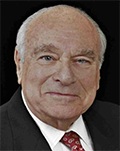 Bruce Kauffman, C’56, a former lecturer at Penn’s Law School and a former justice on the Supreme Court of Pennsylvania, passed away on November 29, 2021, from complications of dementia. He was 86.
Bruce Kauffman, C’56, a former lecturer at Penn’s Law School and a former justice on the Supreme Court of Pennsylvania, passed away on November 29, 2021, from complications of dementia. He was 86.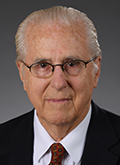 John Keene, MCP’66, a professor emeritus of city and regional planning in Penn’s Weitzman School of Design, passed away on March 4. He was 90.
John Keene, MCP’66, a professor emeritus of city and regional planning in Penn’s Weitzman School of Design, passed away on March 4. He was 90. Lynette Dorothy Loose, CGS’99, a former administrator in several departments at Penn’s School of Arts and Sciences, passed away on December 25, 2021. She was 78.
Lynette Dorothy Loose, CGS’99, a former administrator in several departments at Penn’s School of Arts and Sciences, passed away on December 25, 2021. She was 78. The American Academy of Political and Social Science (AAPSS) has selected Dolores Albarracín, the Alexandra Heyman Nash Penn Integrates Knowledge University Professor at the Annenberg School, as a 2022 Political and Social Science Fellow.
The American Academy of Political and Social Science (AAPSS) has selected Dolores Albarracín, the Alexandra Heyman Nash Penn Integrates Knowledge University Professor at the Annenberg School, as a 2022 Political and Social Science Fellow.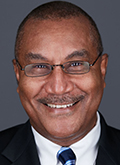 Joseph S. Francisco, the President’s Distinguished Professor of Earth and Environmental Science and a professor of chemistry in the School of Arts and Sciences, has been named a Phi Beta Kappa Visiting Scholar for 2022-2023. Each year, the Phi Beta Kappa Society selects top scholars in the liberal arts and sciences to visit—in person or virtually—universities and colleges where Phi Beta Kappa chapters are located. Visiting scholars meet with students and faculty and present a major lecture, contributing to the intellectual life of the institutions by making possible an exchange of ideas. The 2022-2023 scholars will also participate in a podcast called Key Conversations with Phi Beta Kappa.
Joseph S. Francisco, the President’s Distinguished Professor of Earth and Environmental Science and a professor of chemistry in the School of Arts and Sciences, has been named a Phi Beta Kappa Visiting Scholar for 2022-2023. Each year, the Phi Beta Kappa Society selects top scholars in the liberal arts and sciences to visit—in person or virtually—universities and colleges where Phi Beta Kappa chapters are located. Visiting scholars meet with students and faculty and present a major lecture, contributing to the intellectual life of the institutions by making possible an exchange of ideas. The 2022-2023 scholars will also participate in a podcast called Key Conversations with Phi Beta Kappa.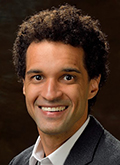 Ryan Hynd, an associate professor of mathematics in the School of Arts and Sciences, has been awarded the American Mathematical Society (AMS) Claytor-Gilmer Fellowship for the 2022–2023 academic year. The fellowship was established to further excellence in mathematics research and to help generate wider and sustained participation by Black mathematicians. Recipients are recognized for their achievements as well as their significant potential for further contributions to mathematics.
Ryan Hynd, an associate professor of mathematics in the School of Arts and Sciences, has been awarded the American Mathematical Society (AMS) Claytor-Gilmer Fellowship for the 2022–2023 academic year. The fellowship was established to further excellence in mathematics research and to help generate wider and sustained participation by Black mathematicians. Recipients are recognized for their achievements as well as their significant potential for further contributions to mathematics.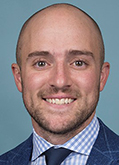 Men’s Squash head coach Gilly Lane has been unanimously selected as Ivy League Coach of the Year. A Philadelphia native and 2007 alumnus, Mr. Lane has led the program since 2016, and the Red & Blue have been steadily improving since his arrival. This year, the Quakers finished with a 16-0 record—defeating every other Top 10 team in the country in the process—and captured their first outright Ivy League Championship since 1968-1969.
Men’s Squash head coach Gilly Lane has been unanimously selected as Ivy League Coach of the Year. A Philadelphia native and 2007 alumnus, Mr. Lane has led the program since 2016, and the Red & Blue have been steadily improving since his arrival. This year, the Quakers finished with a 16-0 record—defeating every other Top 10 team in the country in the process—and captured their first outright Ivy League Championship since 1968-1969. In recognition of extraordinary efforts and steadfast service, Joseph E. Bavaria, co-director of the Penn Aorta Center, has been presented with the Society of Thoracic Surgeons’ (STS) 2022 Distinguished Service Award at the society’s 58th Annual Meeting. Dr. Bavaria—the society’s former president and an STS member since 1996—is currently president of the Thoracic Surgery Foundation and has served on numerous society leadership bodies. With interests and expertise in aortic disease, aortic dissections, as well as aortic valve repair and valve-sparing procedures, Dr. Bavaria has authored or co-authored more than 540 peer-reviewed journal articles, abstracts, and book chapters. In addition, he has participated in nearly 800 presentations on these topics. The Distinguished Service Award, established in 1969, recognizes individuals who have made significant and far-reaching contributions to STS and the specialty.
In recognition of extraordinary efforts and steadfast service, Joseph E. Bavaria, co-director of the Penn Aorta Center, has been presented with the Society of Thoracic Surgeons’ (STS) 2022 Distinguished Service Award at the society’s 58th Annual Meeting. Dr. Bavaria—the society’s former president and an STS member since 1996—is currently president of the Thoracic Surgery Foundation and has served on numerous society leadership bodies. With interests and expertise in aortic disease, aortic dissections, as well as aortic valve repair and valve-sparing procedures, Dr. Bavaria has authored or co-authored more than 540 peer-reviewed journal articles, abstracts, and book chapters. In addition, he has participated in nearly 800 presentations on these topics. The Distinguished Service Award, established in 1969, recognizes individuals who have made significant and far-reaching contributions to STS and the specialty. Gregory Corder, an assistant professor of psychiatry and neuroscience, received the 2021 Rita Allen Foundation Award in Pain, which celebrates pioneering early-career scientists whose research holds exceptional promise for revealing new pathways to understand and treat chronic pain. Dr. Corder leads research which aims to decipher the neural basis of how the brain generates the perception of pain, and how pathological dysfunction within these brain networks leads to the transition to chronic pain and drug abuse.
Gregory Corder, an assistant professor of psychiatry and neuroscience, received the 2021 Rita Allen Foundation Award in Pain, which celebrates pioneering early-career scientists whose research holds exceptional promise for revealing new pathways to understand and treat chronic pain. Dr. Corder leads research which aims to decipher the neural basis of how the brain generates the perception of pain, and how pathological dysfunction within these brain networks leads to the transition to chronic pain and drug abuse.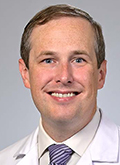 Scott Peslak, a faculty instructor in hematology-oncology, who cares for patients in the comprehensive sickle cell program and comprehensive adult thalassemia program, is one of 36 recipients of the 2022 American Society of Hematology (ASH) Scholar Award and one of 12 to receive the Basic/Translational ASH Fellow Award, which provides funding of $100,000 to support Dr. Peslak’s research. The ASH Scholar Awards recognize the importance of furthering the understanding, diagnosis, treatment, and prevention of disorders affecting the blood. This award will support Dr. Peslak’s work in the study of red cell disorders, novel regulators of fetal hemoglobin, and new genetic and pharmacologic therapies for the treatment of sickle cell disease.
Scott Peslak, a faculty instructor in hematology-oncology, who cares for patients in the comprehensive sickle cell program and comprehensive adult thalassemia program, is one of 36 recipients of the 2022 American Society of Hematology (ASH) Scholar Award and one of 12 to receive the Basic/Translational ASH Fellow Award, which provides funding of $100,000 to support Dr. Peslak’s research. The ASH Scholar Awards recognize the importance of furthering the understanding, diagnosis, treatment, and prevention of disorders affecting the blood. This award will support Dr. Peslak’s work in the study of red cell disorders, novel regulators of fetal hemoglobin, and new genetic and pharmacologic therapies for the treatment of sickle cell disease.
 The American Institute for Medical and Biological Engineering has elected Ragini Verma, a professor of radiology, to its College of Fellows, which is comprised of the top two percent of medical and biological engineers in the country. Dr. Verma—who leads the DiCIPHR (Diffusion and Connectomics in Precision Healthcare Research) lab at Penn—is being recognized for her world-class research program in translational connectomics, the study of brain connectivity using diffusion MRI (dMRI). Her research aims to solve clinically motivated problems to improve patients’ quality of life. She has made important contributions in studying the brain connectome in traumatic brain injury, brain gliomas, and schizophrenia.
The American Institute for Medical and Biological Engineering has elected Ragini Verma, a professor of radiology, to its College of Fellows, which is comprised of the top two percent of medical and biological engineers in the country. Dr. Verma—who leads the DiCIPHR (Diffusion and Connectomics in Precision Healthcare Research) lab at Penn—is being recognized for her world-class research program in translational connectomics, the study of brain connectivity using diffusion MRI (dMRI). Her research aims to solve clinically motivated problems to improve patients’ quality of life. She has made important contributions in studying the brain connectome in traumatic brain injury, brain gliomas, and schizophrenia.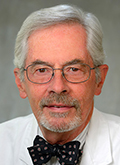 Reed E. Pyeritz, William Smilow Professor of Medicine emeritus in the Perelman School of Medicine, has been named by the National Academies of Sciences, Engineering and Medicine (NASEM) to serve on the Committee on Selected Heritable Disorders of Connective Tissue Disorders and Disability. The committee serves as an advisory body for the Social Security Administration. It will use published evidence and professional experience to develop a report that will examine the diagnosis, treatment, and prognosis of the selected conditions, as well as levels of associated functional limitation, in adults and children in the U.S. population.
Reed E. Pyeritz, William Smilow Professor of Medicine emeritus in the Perelman School of Medicine, has been named by the National Academies of Sciences, Engineering and Medicine (NASEM) to serve on the Committee on Selected Heritable Disorders of Connective Tissue Disorders and Disability. The committee serves as an advisory body for the Social Security Administration. It will use published evidence and professional experience to develop a report that will examine the diagnosis, treatment, and prognosis of the selected conditions, as well as levels of associated functional limitation, in adults and children in the U.S. population.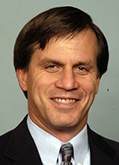 Longtime wrestling coach Roger Reina has been selected by his colleagues as Eastern Intercollegiate Wrestling Association (EIWA) Coach of the Year at the 118th EIWA Championships at Cornell University in Ithaca, New York.
Longtime wrestling coach Roger Reina has been selected by his colleagues as Eastern Intercollegiate Wrestling Association (EIWA) Coach of the Year at the 118th EIWA Championships at Cornell University in Ithaca, New York.
